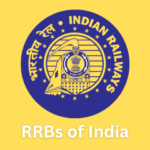Log In
Sign Up

About
The Indian Railways Board is the apex governing body of Indian Railways, a state-owned enterprise under the Ministry of Railways, Government of India. Established in 1905, it oversees the world’s fourth-largest railway network, which serves millions of passengers daily and carries a significant share of freight transportation across the country. Known for its scale and efficiency, Indian Railways is a vital backbone of India’s economy, infrastructure, and connectivity.
Core Responsibilities
The Indian Railways Board is responsible for managing the strategic, operational, and financial aspects of the railway system. Its key functions include:
Policy Formulation: Setting policies for the smooth functioning of railways across passenger and freight operations.
Planning and Development: Overseeing infrastructure projects, network expansions, and technological advancements.
Recruitment: Managing large-scale hiring processes through Railways Recruitment Boards (RRBs) to meet staffing needs.
Safety and Regulation: Ensuring safety standards are adhered to across all operations.
Financial Oversight: Managing revenue, budgets, and cost efficiencies for Indian Railways.
Organizational Structure
The Indian Railways Board is led by a Chairman and Chief Executive Officer (CEO), supported by functional members specializing in specific domains:
Member (Infrastructure): Oversees track maintenance, station upgrades, and project implementations.
Member (Operations & Business Development): Focuses on passenger services, freight operations, and business growth.
Member (Finance): Manages budgeting, revenue generation, and financial policies.
Member (Rolling Stock): Handles manufacturing, procurement, and maintenance of locomotives and coaches.
Member (Traction & Electrification): Drives electrification projects and sustainable energy initiatives.
The Board works closely with zonal railway divisions and production units to implement policies and projects at the ground level.
Key Divisions of Indian Railways
Indian Railways is divided into 18 zones, each managed by a General Manager, reporting to the Board. Prominent zones include:
Northern Railways (Delhi)
Central Railways (Mumbai)
Eastern Railways (Kolkata)
Southern Railways (Chennai)
Each zone is further divided into divisions for operational efficiency.
Services Offered
Indian Railways Board supervises an array of services:
Passenger Services:
Operates daily trains, from local suburban services to premium options like Rajdhani, Shatabdi, and Vande Bharat trains.
Freight Services:
Handles bulk cargo transportation, including coal, steel, and agricultural products.
Tourism and Luxury Services:
Offers luxury trains like Palace on Wheels and Bharat Gaurav trains to promote tourism.
Innovation and Technology:
Focuses on modernizing rail operations through AI, IoT, and digital ticketing platforms.
Achievements and Milestones
Electrification Drive: Aiming to achieve 100% electrification by 2030, contributing to India’s sustainability goals.
Vande Bharat Express: Launching India’s first indigenously built high-speed train.
Freight Corridors: Developing dedicated freight corridors to boost cargo efficiency.
Digital Transformation: Implemented e-ticketing, real-time tracking, and automated signaling systems.
Revenue and Financials
Indian Railways generates revenue from passenger ticketing, freight services, tourism, and auxiliary services. It has a diversified portfolio of income sources, including public-private partnerships (PPPs) for new projects and station redevelopment.
Employment and Recruitment
Indian Railways is one of the largest employers globally, with over 1.4 million employees. The Railways Recruitment Boards (RRBs) and Railway Recruitment Cells (RRCs) handle large-scale recruitment for roles across technical, administrative, and operational departments.
With 21 regional offices across India, each catering to specific zones, RRB conducts examinations, manages recruitment notifications, and ensures the selection of qualified candidates for technical, non-technical, and administrative roles in the Indian Railways.
RRB operates under the guidance of the Railway Recruitment Control Board (RRCB), ensuring consistent recruitment practices across all zones.
Sustainability and Future Goals
The Board is committed to sustainability through initiatives like:
Green Railways by 2030: Achieving carbon neutrality.
Enhanced Electrification: Replacing diesel engines with electric ones.
Digital Upgrades: Expanding AI and IoT for predictive maintenance and smoother operations.
End Note
The Indian Railways Board is not just a governing body but the backbone of India’s transport ecosystem. With a focus on innovation, efficiency, and sustainability, it continues to lead Indian Railways toward becoming a global benchmark in rail transport and logistics. For both passengers and employees, the Board exemplifies reliability, growth, and progress.
Job Notifications & More
Railway Recruitment Boards Hiring 32438 New Employees on Various Posts
- Indian Railways Board
- Anywhere
Indian Railways Recruitment 2025: 736 Teaching Positions
- Indian Railways Board
- Anywhere
Explore Railway Jobs in 2025: Latest Openings for All Qualifications
- Indian Railways Board
- Anywhere
Overview
-
Location: Rail Bhavan, New Delhi, India
-
Founded: 1905
-
Company Size: 50,000+
-
Industry: Public Sector Agency
-
Revenue: ₹ 21000 Cr - ₹50000 Cr


